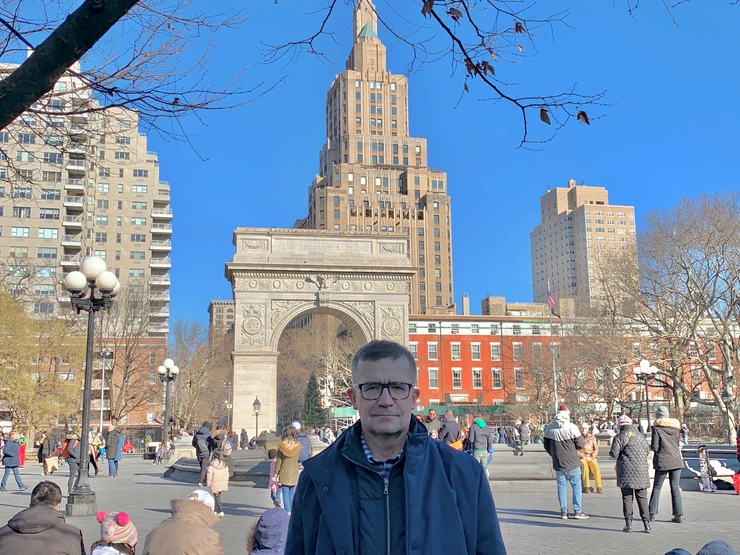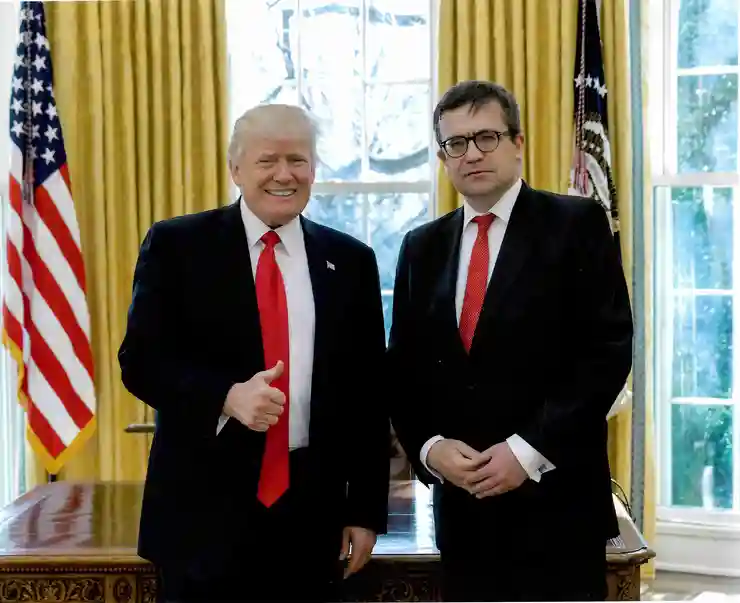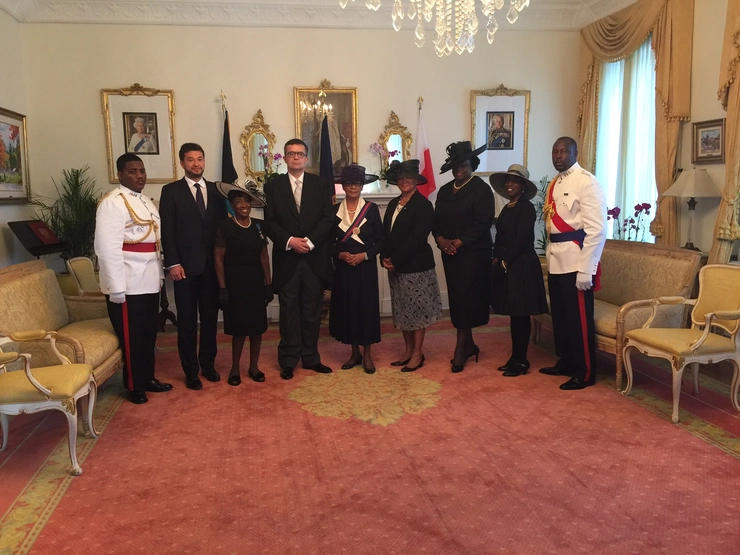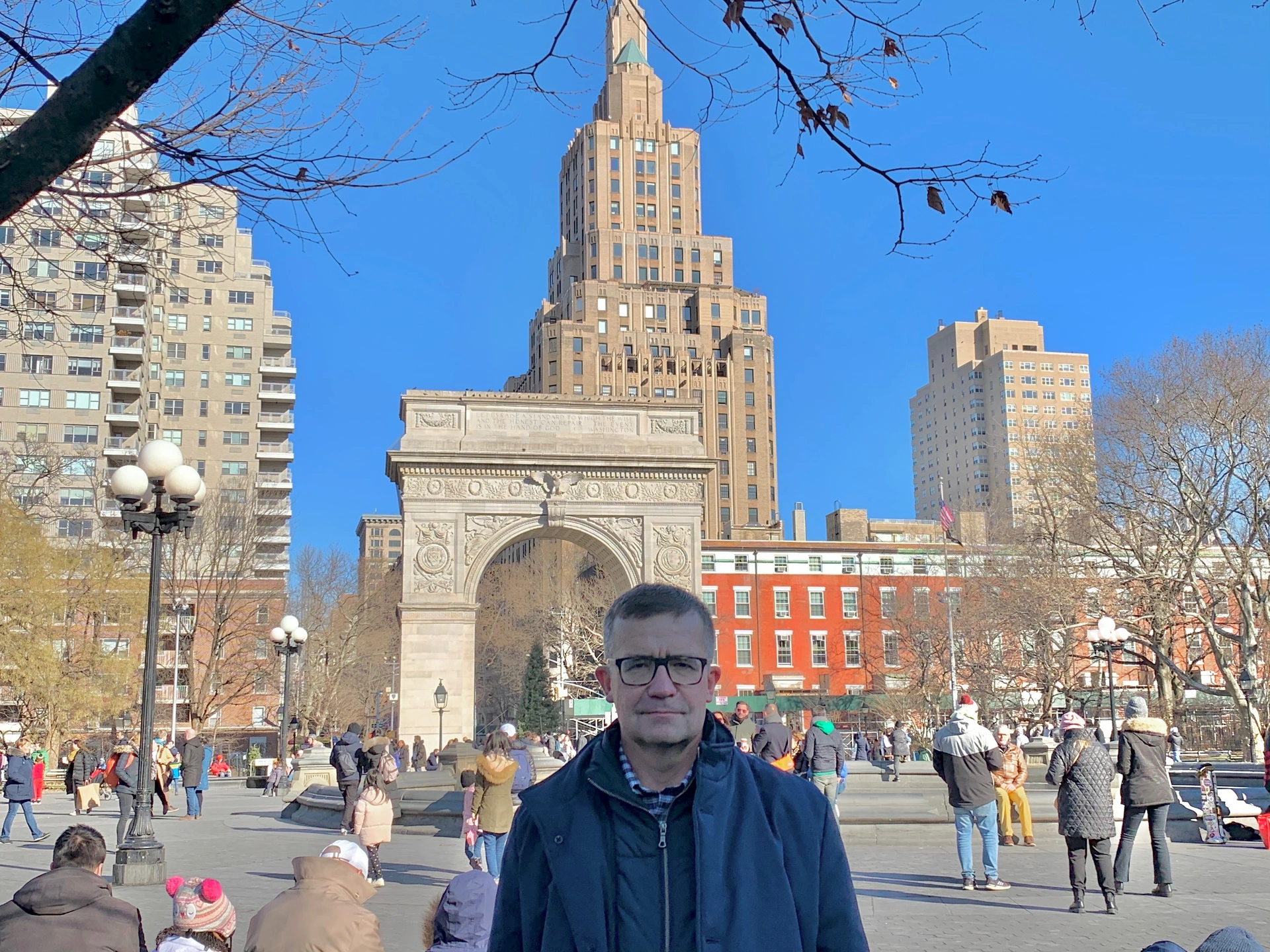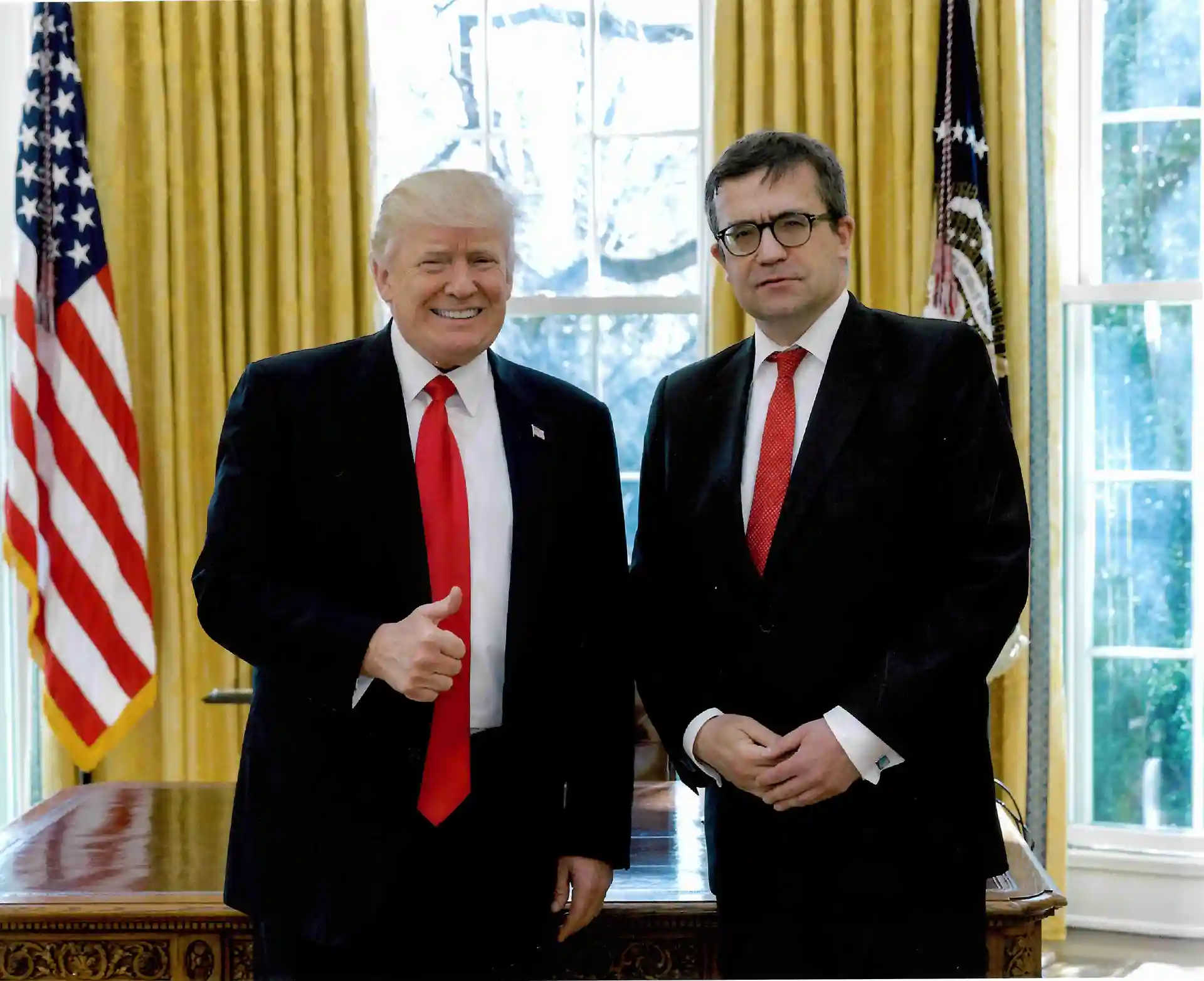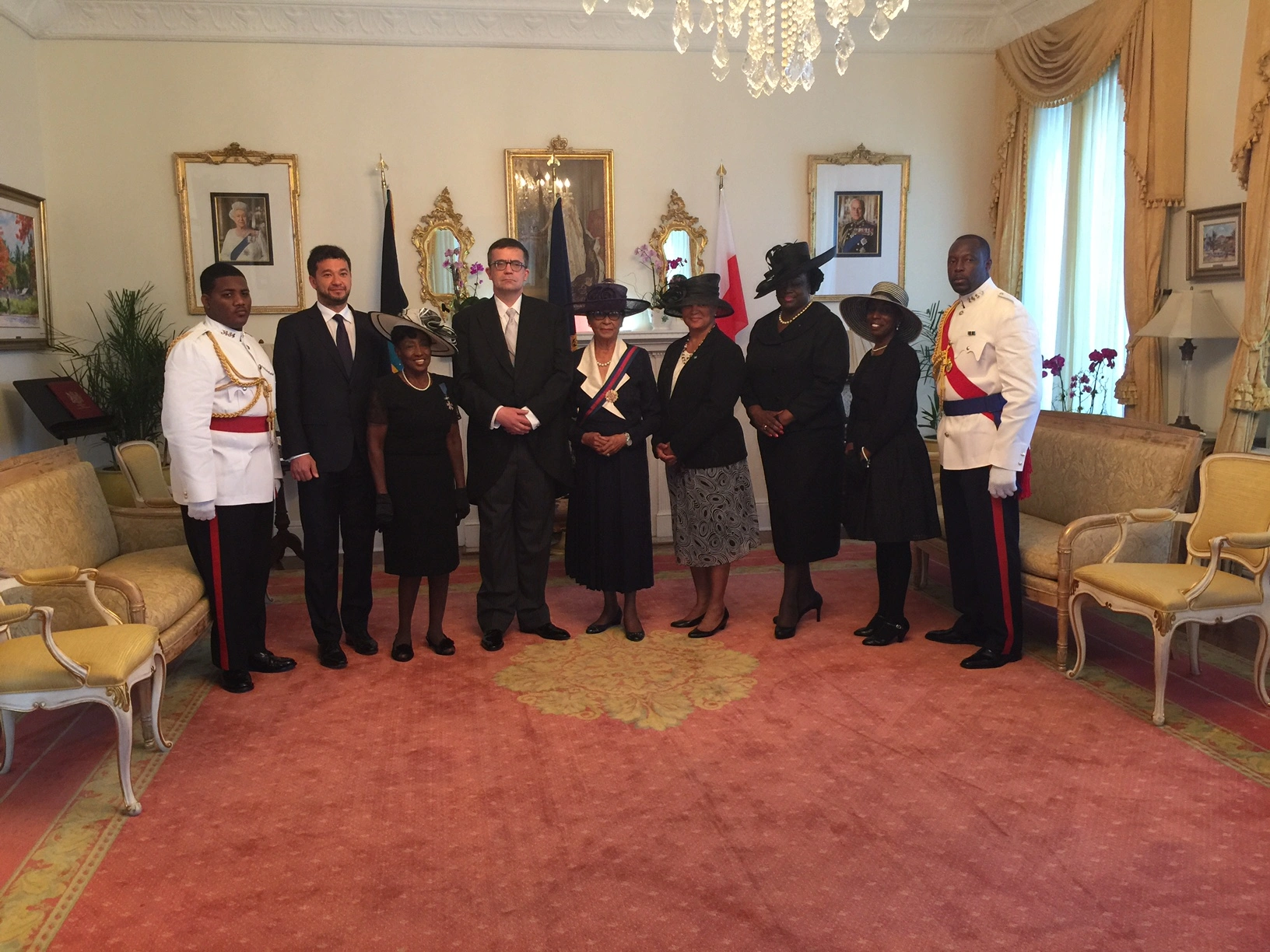Interview with Prof. Dr. habil. Dr. h.c. Piotr Wilczek (University of Warsaw)
Ambassador of the Republic of Poland to the United States of America and the Commonwealth of the Bahamas
Holt Meyer (H. M.): What is Poland’s position in the West in the second half of 2019?
Piotr Wilczek (P. W.): The answer depends on what we understand to be "the West". Poland is obviously an important part of the West because of its economic strength, religion, values, history and tradition. Poland serves as a Western partner of the Eastern Partnership, which is comprised of six Eastern European partners of the EU: Armenia, Azerbaijan, Belarus, Georgia, Moldova and Ukraine. But the situation is more complicated. For example, Lithuania, Latvia and Estonia, located further to the east, are also undoubtedly Western countries with stable economies steadfastly attached to western values. This notion of "the West" is obviously political and related more to values and history than to geography. For that reason, the concept of "Eastern Europe" used in America on an everyday basis, but also in relation to Poland (usually without any hidden agenda), causes some frustration amongst Poles.
As a major EU and NATO member, Poland in 2019 undoubtedly belongs to the West, and its position in the "western family" is strong. At the same time, however, one can see differences between Poland and other Western countries. Allow me to discuss just one aspect of Poland’s "westernness" – its deep connection to the Roman Catholic tradition and its values. This aspect often causes Poland’s position on various issues to differ from the positions of other Western countries. Knowledge of the role of Polish Catholicism helps to understand the characteristic features of Poland’s westernness.
As John Paul II mentioned in his encyclical, Slavorum Apostoli, "Western Christianity, after the migrations of the new peoples, had amalgamated the newly arrived ethnic groups with the Latin-speaking population already living there, and had extended to all, in order to unite them, the Latin language, liturgy and culture which had been transmitted by the Church of Rome. The uniformity thus achieved gave relatively young and rapidly expanding societies a sense of strength and compactness, which contributed to a closer unity among them and a more forceful affirmation in Europe" (JOHN PAUL II: 1985).
Modern-day Poland inherited the multireligious tradition of the Polish-Lithuanian Commonwealth (14th–18th centuries) – including Eastern Orthodox Christianity – but at the same time is deeply rooted in the western, Roman Catholic Christianity. As the leading spiritual force of the country, the Catholic Church and the role of Catholicism in Polish history has always been of vital importance. Its significance was especially evident in the mid-1980s, when all key figures of world politics knew well that the metaphorical heart of Poland was in the Vatican, and that Pope John Paul II, since his election in 1978, had played an instrumental role in Poland’s transformation. His triumphant pilgrimage to Poland in 1979 encouraged my compatriots to unite, inspiring the birth of the Solidarity movement in 1980 and giving strength to its development. The support of the Pope and of the local Catholic Church for the anti-Communist opposition, together with the activities of skillful Vatican diplomats, influenced the demolition of the Communist regime. Latin Christianity has always helped to maintain strong relations with the West, even during the darkest years of Communism; John Paul’s alliance with Ronald Reagan and Margaret Thatcher was a clear symbol of that. The unusual, unofficial alliance between these two leaders and the Pope, much better known nowadays thanks to the recent publication of classified documents from that era, illustrates the unprecedented role of the Catholic Church in that particular period’s political developments (O’SULLIVAN: 2008).
Since the partitioning of Poland at the end of the 18th century, the growing influence of the Roman Catholic Church has been bolstered by a number of factors (cf. KŁOCZOWSKI: 2000):
- the patriotic leadership of Roman Catholic bishops and priests in the 19th century, especially under the Russian and Prussian partitions,
- the political role of the Roman Catholic Church in 1918–1939, imposed by the new republic; even the Polish constitution included an unusual article about the Roman Catholic Church’s "privileged position among equal religious denominations" (PEASE: 2009),
- the mass support of Roman Catholic clergy given to the Polish resistance movement against the German and Soviet occupations during the Second World War,
- the change of borders and mass migrations after 1945 which resulted in national and religious homogeneity,
- the Church’s support of the anti-Communist opposition between 1945 and 1989.
There have been many significant changes in the role of the Roman Catholic Church in Poland since 1989, during which Poland itself has been moving from the peripheries of Europe to a more central position. "Competition, science, the rule of law, medicine, consumerism and the work ethic" (FERGUSON: 2011) have become core tenets of Poland’s identity. Thanks to the transformation of the last 30 years, Poland has moved to the West on a symbolic map of Europe. Democratic ideas, secularization, and the influence of European Union standards have also influenced Polish religion. The current changes provide valuable material for sociologists who today engage in research on, for example, the clash of conservative and liberal tendencies in the Church (cf. WILCZEK: 2016).
There are many aspects of Poland’s current westernness that should be discussed, but I believe that the religious aspect is particularly worth discussing as it helps to understand many current differences between Poland and other Western European countries.
H. M.: In what way, if at all, have you as the Ambassador of Poland to the US fostered a particular vision of the West? How have you fostered this vision not only in terms of Western institutions such as NATO, but from the point of view of civilization and culture?
P. W.: During one of my first interviews here in the United States, published in September 2017, I stated,
We need still to preserve something that in cultural history is called "The West". There’s a book published recently by a famous British-American historian, Niall Ferguson, Civilization: The West and the Rest. He is trying to prove that Western Civilization beginning with the Renaissance and the Reformation in Europe has just finished and there will be a larger and larger role of Asia, especially China, and also Russia in future history. This alliance of the United States and Europe is very important to preserve what Trump called "Western Civilization." For many people this might sound controversial, but I think for the contemporary world with all kinds of values and priorities, this civilization based on Christianity, the French revolution, ideas of enlightenment, ideas of the founding fathers in this country, that’s something really important. I’m a little conservative in this respect… I really believe in ideas like the great books — that there is a set of great books that formed our civilization, which are still worth reading, all kinds of classics that we have in Europe and America. I think the values of the so-called "Western Civilization" should be preserved because history has shown us in the last 70 years that this Euro-Atlantic alliance was very effective at preserving peace. There were no major wars in the EU. I truly believe in American leadership. It may sound very anachronistic, but I think the world still needs American leadership supported by Europe and European values. The U.S. is the most powerful country and I hope it will be for many, many years. I think that in the world such a feeling exists that countries like Russia and China want to challenge this idea of American or Euro-Atlantic leadership, but for a kind of balance in the world, this is very important (WILCZEK: 2017).
One may be surprised that I was quoting President Trump in referring to Western Civilization. However, the speech he delivered in Warsaw in July of 2017 was for many Poles a very important manifesto of what most Poles and most Americans, irrespective of political views, are attached to: the values of the western world.
As I said earlier in that same interview, "Donald Trump’s visit was important because when you read his speech in Warsaw, it was about the Euro-Atlantic alliance, about security, unity, and what he called defending Western Civilization. I think it’s important that Europe remembers its heritage and that its unity is based on values."
I am well aware of how controversial the above quotations may sound, especially more than two years after the aforementioned speech. However, I still believe that the Euro-Atlantic alliance exists, that it is western and that it is based in western values. In his speech, which Poles understood simply as a message from their most important ally in the West, Trump used the word "West" twelve times, e.g. in the following passage:
Our own fight for the West does not begin on the battlefield — it begins with our minds, our wills, and our souls. Today, the ties that unite our civilization are no less vital, and demand no less defense, than that bare shred of land on which the hope of Poland once totally rested. Our freedom, our civilization, and our survival depend on these bonds of history, culture, and memory. And today as ever, Poland is in our heart, and its people are in that fight. Just as Poland could not be broken, I declare today for the world to hear that the West will never, ever be broken. Our values will prevail. Our people will thrive. And our civilization will triumph (TRUMP: 2017).
I remember how his address was criticized as one-sided, conservative, etc. But at the same time, it revived a serious discussion on what the West and western values are about and on the myriad different ways they are understood today.
H. M.: Which personal experience or encounter has made you think most intensively about the state of, the endangerment of, or the glory of the West? Perhaps one experience for each of the three conditions?
P. W.: As far as the state of the West and endangerments are concerned, a truly eye-opening encounter (and not only for me) was with the recent, widely discussed and rather controversial interview with President Emmanuel Macron of France in "The Economist". In the interview, he discussed Europe’s situation in relation to the United States on the one hand, and Russia, China, and Turkey as growing regional powers on the other. In a very alarming tone, he called for the revitalization of Europe which, in his estimation, is becoming increasingly vulnerable to confrontation with both the new approach of America to the transatlantic project and with the individual, opposing ambitions of Russia, Turkey, and China.
As he observed:
Europe was basically built to be the Americans’ junior partner. That was what lay behind the Marshall Plan from the beginning. And this went hand in hand with a benevolent United States, acting as the ultimate guarantor of a system and of a balance of values, based on the preservation of world peace and the domination of Western values." But everything has changed so far. „There is a deep current of thought that was structured in the period between 1990 and 2000 around the idea of the "end of history", of a limitless expansion of democracy, of the triumph of the West as a universal value system. That was the accepted truth at the time, until the 2000s, when a series of shocks demonstrated that it wasn’t actually so true." (MACRON: 2019)
In the light of all of the challenges the West is facing now, it is really difficult to think – in political and cultural terms – about the glory of the West.
H. M.: You come from an institute in Warsaw which fostered liberal arts. How would you view the transition from being a professor of liberal arts to your current position as Ambassador? Do you see any links or commonalities between the two, or has becoming Ambassador been a complete reset?
P. W.: On the one hand, becoming Ambassador was a complete reset. I faced new people and new challenges, especially because I arrived in Washington two days before the presidential election, when everyone here thought that Hillary Clinton would become President. The election of Donald Trump was a real shock for the political and diplomatic communities here in the Bubble, as Washington, DC is sometimes called. During my training and consultations back in Warsaw, I was being prepared to work with a Democratic administration; once on the ground in Washington, I found myself in a completely different political environment. But I was not in shock. It was extremely fascinating. My initial feeling was that I had just become part of this completely new political thriller – this was the first episode and there will be a next episode, but nothing will be like before. So, from this point of view, I was really excited that something new had just started, something very unpredictable with new people to meet and new connections to be made. Many did not accept the situation, but for me, I had no choice – I had to be involved. I had no sentiments, no connections or close friendships here in Washington, so I saw this as an opportunity to make these new connections and to meet these new people.
I knew America as an academic. I spent almost four years (in 1998–2001, 2008 and 2012) at five excellent universities, I worked for three years for a US foundation, and for seven years, in 2009–16, I was in charge of an American-style liberal arts program at the University of Warsaw. Being an ambassador is obviously a completely different job, but my previous professorial experience has proven useful – I was able to discuss translation studies (one of my academic fields of interest) at dinner with the Japanese ambassador’s wife who happened to be a translator; as Ambassador, I was a panelist at a university discussion on Polish cinema and, as a former professor who had offered Polish film courses at two US universities, I spoke about the topic with ease. The connection between academic and diplomatic experiences is much deeper. As a former professor and academic administrator, I feel that I have unique qualifications that are, at times, necessary in my current job. In the past, I negotiated contracts, gave lectures to big audiences and took part in numerous panel discussions. I ran institutions (the likes of which include a university school and college), and led teams and projects. My university seminars were not much different from the weekly meetings with my Embassy colleagues, where we discuss current events and challenges.
H. M.: What does the English language, which you are very proficient in, have to do with the West? Is English the language of the West?
P. W.: English is now not only the language of the West – it is the global language, spoken widely in Western Europe, other parts of Europe, in Asia, and, of course, in the British Commonwealth countries scattered across the world. Like in Theresa May’s "Global Britain" slogan, I wish that Britain will go global and will remain our strong ally. I believe that English will remain a global language, spoken everywhere as the West’s contribution to the unity of the world but no longer as the Western language.
Some time ago, I was watching a video recording of a panel discussion organized by a language school in London which specializes in training foreigners in pronunciation, so that their spoken English may be more understandable in the workplace and in social life. The panelists, however, emphasized that even if this were possible, it would be strange to force people to completely get rid of their accents when their native languages are Spanish, French, Polish or Russian. You cannot force someone to speak like a native of Bristol or Manchester or as a Texan; the only consideration should be whether or not a non-native speaker is fully understood by his interlocutor. This, to me, is a real change in attitude. When I was learning English in the mid-1970s, the goal of many teachers of British English, who dominated in Poland, was to train people to speak RP – the "received pronunciation" – otherwise known as the royal British accent. Even if some teachers still adhere to this pedagogy and end up frustrating their students (because the RP goal is unachievable, unless you start learning English as a baby), the changes have been irreversible – English is no longer a Western language, but instead a global language spoken with variety of native and non-native accents. All of this reminds me of the problems that my American friend from Kentucky who lived in Glasgow faced and had major communications issues with his Scottish plumber. This was the case of two "western" native speakers of English. Eventually, they found ways to understand each other’s accents. I also remember the protests of American students when I was in Chicago: interestingly, they did not understand the English of their Asian professors.
English as a global language and as a universal way of communication was initiated by the West and is obviously a part of the colonial heritage of the West. This fact reminds me of my major diplomatic faux pas: when I was presenting my credentials in Nassau as the Polish Ambassador to the Bahamas, I asked one of the Bahamian officials about their native language. He answered: it’s English. But I further insisted to learn about the original, native language of his ancestors. English, he answered again, quite bluntly this time, which made me realize how inappropriate my question originally was: although locally you might hear "Bahamian English", a mixture of British English, African influence and local dialects, the descendants of African slaves shipped to the Bahamas centuries ago speak the same language as the English settlers who brought them there, and British English has been the common language of the islands since their inception.
H. M.: Tell me about your encounters with Polish people and Polish organizations in the US. Have these encounters taught you something about the positions of Poles in the world? Do these positions represent a Poland that might be considered as the "East of the West"?
P. W.: According to the latest United States Census Bureau estimate, the number of Americans of Polish descent is 9.5 million, although only around 600,000 of them speak Polish. Most belong to the second, third, fourth or fifth generation of Polish Americans, who were born here and who are no longer Polish speakers. Many Polish American organizations concentrate on cultivating traditional cultural or culinary customs and events (celebrating Polish holidays, folk dancing or promoting Polish cuisine). Many of their members do not know Poland and do not speak Polish.
Polish Americans, especially the Polish American Congress, have been very active in helping Polish people and in promoting the Polish case when Poland was under the Communist regime, and their support was crucial during Poland’s accession to NATO, which was a symbolic reunification of Poland with the West. This accession would not have happened as early as 1999 without pressure from Polish American organizations and activists. The New York-based Kosciuszko Foundation, a non-profit organization dedicated to educational, cultural, and artistic exchanges between the United States and Poland and established by Polish Americans in 1925, has worked tirelessly, even throughout the Communist years, through their programs and scholarships to ensure that Poland is an integral part of Western culture.
There are now new generations of Poles who are in their 20s, 30s and 40s. They are often successful entrepreneurs who work hard to maintain the positive relations between the US and Poland – two Western countries. I believe that, among Polish Americans and most Americans who understand Europe, the old, Cold War division between Western and Eastern Europe no longer exists. When I speak with them, I realize that they think of Poland as a part of the same (business) culture and the same civilization that is fundamentally western, and they often make serious business investments in Poland because they know that Poland is a normal, prosperous, civilized, western country. However, some of their parents and grandparents who left Poland in the 60s, 70s or 80s and never returned continue to view Poland through the same lens – as a backward, underdeveloped country – and had many traumatic experiences that make them reluctant to come back and visit. When they finally arrive in Warsaw, Krakow or their birthplaces, which are very often small towns and villages, they cannot believe to what extent the country has changed in the last 30 years. Their fears and trauma are understandable. For me, it is rather difficult to understand why many our fellow EU citizens from France, the Netherlands or Germany think of Poland as a backward, Eastern European country and who are not inclined to visit.
H. M.: The West is associated with concepts such as rationality, the tension between the secular and the religious, and the technological. Could you please reflect on each of these concepts individually through both a scholar’s lens and an ambassador’s lens? A follow-up question: is the West neutral?
P. W.: The tension between the secular and the religious, including the issue of rationality, has interested me both as a scholar and as an ambassador. In my early academic research on Socinianism, I was very much fascinated by the radical concepts of Christianity developed in the works of the Socinians and the way in which they influenced the Western European philosophy of the Enlightenment. The tension between "ratio" and "religio" and very radical (sometimes naïve) attempts to overcome it (as in the Religio rationalis by Andrzej Wiszowaty) also led to discussions about the tensions between the secular and the religious. We can see how the West, but especially Europe, developed in the direction initiated by Enlightenment philosophy and the French Revolution. There were also many examples of religious revivals (both Catholic and Protestant), especially in the 19th and early 20th centuries initiated in opposition to late 18th century breakthrough ideas.
I found it very significant that in her inauguration speech at the European Parliament, the new President of the European Commission mentioned Greek philosophy and Roman law as "the cradle of our European civilization," but she did not mention Christianity.
The European mainstream worldview is secular and is sometimes challenged by conservative and faith-based initiatives which do not have, however, enough power to change the course of events. In this respect, America is very different. With an administration strongly supported by Evangelical circles and with a very religious Vice President; with initiatives for religious freedom and for the defense of Christians around the world; and with heated debates between conservative Christians and liberals, the United States is a fascinating laboratory for someone who wants to study the relationship between religion and politics – from Thomas Jefferson to Mike Pence. The best and most generously funded Museum of the Bible is located in Washington, DC, and TV evangelists are still watched on American TV and in American stadiums. Tension between secularism and religion has a very different dynamic here than in Europe and the Puritan tradition is still alive in various forms. When I think about my future research, I believe it will be about the relationship between religion and politics – a continuation of my research on the Reformation and Counter-Reformation in 16th and 17th century Europe. Paradoxically, these two areas of studies are not as different as one may think.
I do not know exactly what the word "neutral" could mean in this context, but I think that the West is not neutral. The debate about values and principles, including the role of religion in society, is very heated.
H. M.: You are an expert on the Reformation in Poland and throughout Europe. One could say that the Renaissance and the Reformation are the beginnings of the West. Do you have any thoughts on that moment as a beginning of the West and how Poland actively participated? Do you look at that historiography in your work as ambassador and consider things Western from that point of view?
P. W.: Obviously, you can think of the Renaissance and the Reformation as the beginnings of the West. However, the 966 Baptism of Poland as the beginning of Christianization is perceived in the Polish tradition as the real start of our "membership" in the West as a civilizational and religious entity. Many times in the past, Polish religious and political leaders emphasized Poland’s affiliation with the Western, Latin Christianity and, by extension, Western civilization. However, from the 14th to the 18th century, the Kingdom of Poland existed in a union with the Grand Duchy of Lithuania, and from the end of the 16th century it practically functioned as one state. The Polish-Lithuanian Commonwealth was a kingdom with one sovereign, parliament and army. It comprised the larger parts of present-day Poland, Lithuania, Latvia, Estonia, Belarus and Ukraine. Thus, with the exception of Muscovy, it was the largest country in Europe at that time. The Commonwealth was a multinational, multireligious and multicultural country comprised less than 40 percent of Roman Catholics, the remainder of which was divided between the Eastern Orthodox, Jewish, Lutheran, Calvinist and even Muslim minorities (WILCZEK: 1999). For that reason, the tradition of Poland in the period when it was a major power uniting the East and the West was of course – also in the religious sense – both eastern and western. And obviously, this golden age of the Commonwealth in the 16th and 17th century coincided with the Renaissance and Reformation. I wrote a lot about these issues in my book, "Polonia Reformata," published in Germany in 2016, where I also referred to the concept of Poland as a heart of Europe (developed in the famous book by Norman Davies).
In his book published eight years ago, The Ghostly Body of the King. Peripheral Struggles with Contemporary Form, the Polish sociologist Jan Sowa discusses the idea of the old Polish Commonwealth as a periphery of Europe. This is a book about a peripheral, disintegrating and anachronistic country, deprived of a real king; after the death of the last king from the Jagiellonian dynasty in 1572, all subsequent kings were elected by the nobility, so they were not "real" kings. The real rulers of the country were rich magnates – landowners with their vast landed estates, which had been acquired thanks to the colonial expansion of Poland to the east. The country, which was finally composed in 1569 of two previously separate states – the Kingdom of Poland and the Grand Duchy of Lithuania – is perceived in Sowa’s book as a weak, peripheral, feudal, anachronistic state, but at the same time as a colonial power whose expansion to the east caused weakness in the central government and the power’s own unavoidable collapse at the end of the 18th century when it was partitioned by its three neighboring countries (SOWA: 2011).
This approach is heavily influenced both by the skepticism of 19th-century Polish historians from Cracow and by the works of Polish historians of the 1950s and 60s who were inspired by Marxism and the French Annales school of historical research. For this reason, the historical analyses presented in this controversial book are not new. The author very skillfully combines findings and conclusions of prominent Marxist historians with cultural and psychoanalytical theories of trendy, contemporary French and British thinkers. The whole concept of the old Polish Commonwealth as a periphery is of course not new and is likely to be appreciated by readers today as more reliable than the concept of Poland as the heart of Europe or a part of Western Europe.
It is merely a coincidence that Niall Ferguson’s famous book, Civilization: the West and the Rest, was published in the same year. The book, authored by a renowned Harvard and Oxford historian, examines what the author calls the most interesting question of our day: "Why, beginning around 1500, did a few small polities on the western end of the Eurasian landmass come to dominate the rest of the world?" He attributes this divergence to the West’s development of six "killer apps" largely missing elsewhere in the world. According to him, Western Europe’s domination over the rest of the world was based on "competition, science, the rule of law, medicine, consumerism and the work ethic" (FERGUSON: 2011).
And the Western European work ethic – as we have known very well since the publication of Max Weber’s book The Protestant Ethic and the Spirit of Capitalism – is based on Protestantism. In this context, the Polish-Lithuanian Commonwealth was a peripheral country, in no sense being the center or the heart of Europe, as Europe was understood to be Western Europe. Although Poland was the largest country in Europe – geographically understood – and is also accused of having been a colonial power, the real powers and colonial powers perceived as central to Europe were England, France, Spain and the Holy Roman Empire. It is not accidental that none of the European territories beyond the borders of the ancient Roman Empire were included in the dominant discourse of Europe. The territory between the West and the East, between the eastern borders of the Holy Roman Empire and the western borders of today’s Russia, was radically called by Sowa a "no man’s land". In this way, Sowa recalled the old concept of Eastern Europe. The story of how the continent of Europe came to be conceived of as divided into Western Europe and Eastern Europe is presented by Larry Wolff in his fascinating book entitled Inventing Eastern Europe. The Map of Civilisation on the Mind of the Enlightenment:
Almost all of the commentators on Eastern Europe, whether they ever set foot on its soil, looked upon it as half-barbarian and half-civilised and wrote about it in a condescending manner that has affected Western perceptions ever since (WOLFF: 1994).
Whatever we may think about the validity of the old concept of Eastern Europe and the new attempts to justify its existence, as well as about the division between the East and the West or the "West and the Rest," it would be difficult to replace the cultural, economic and political concept of Poland as a periphery with a geographical, Romantic or nationalistic concept of it as the heart or midpoint of Europe – not to mention the idea of Poland as a part of Western Europe. As you can see, the position of Poland as a part of the West in the age of the Renaissance and Reformation has been questioned. But, in my opinion, Poland and the whole Commonwealth was seriously "westernized" at that time, at least politically and culturally (cf. WILCZEK: 2016).
H. M.: What have you read recently (big or small, a line of poetry or a book) that gave you a new perspective on some notion of the West?
P. W.: I would again refer to President Macron’s interview. This is one of the most important, recently published texts on the West. I think that every American and European politician, expert and academic should read it. Even when we completely disagree with some of the author’s statements, the diagnosis he presented is one of the most thought-provoking recent statements on the condition of the West – that includes both Europe and America. However, we should not forget that the concept of Western civilization (whether more conservative, like in Trump’s aforementioned speech in Warsaw or more liberal) is still present in the thinking of public intellectuals both in Europe and America, and is also fundamental for the contemporary idea of Europe and America, even if we have to rethink the postwar idea of transatlantic relations. In light of current challenges, the vision of the transatlantic relationship established in the 1950s or 1960s is no longer valid in confrontation with Chinese ambitions, Islamic terrorism or the refugee crisis. But I strongly believe that the idea of the West still exists in the hearts and minds of both Europeans and Americans. Often times, they just don’t speak about the West. I hope that this notion of the West will never be considered politically incorrect or anachronistic, although in today’s global environment it is impossible to speak about "the West and the rest". The globalized world is much more complicated. The West no longer plays a dominant role and we should rethink its role and its future.
Works Cited
DAVIES, NORMAN (1989), Heart of Europe. A Short History of Poland, Oxford: Oxford University Press.
FERGUSON, NIALL (2011), Civilization: The West and the Rest, New York, Penguin Press.
JOHN PAUL II (1985), Slavorum Apostoli (http://www.vatican.va/content/john-paulii/en/encyclicals/documents/hf_jp-ii_enc_19850602_slavorum-apostoli.html). Accessed 30 November 2019.
KŁOCZOWSKI, JERZY (2000), A History of Polish Christianity, Cambridge: Cambridge University Press.
MACRON, EMMANUEL (2019), Emmanuel Macron in his own words (English). The French president's interview with The Economist (https://www.economist.com/europe/2019/11/07/emmanuel-macron-in-his-own-words-english). Accessed 30 November 2019.
O’SULLIVAN, JOHN (2008), The President, the Pope, and the Prime Minister: Three Who Changed the World, Washington: Regnery Publishing.
PEASE, NIGEL (2009), Rome’s Most Faithful Daughter: The Catholic Church and Independent Poland, 1914–1939, Columbus: Ohio University Press.
SOWA, JAN (2011), Fantomowe ciało króla. Peryferyjne zmagania z nowoczesną formą, Kraków: Uniwersitas.
TRUMP, DONALD J. (2017), Remarks by President Trump to the People of Poland (https://www.whitehouse.gov/briefings-statements/remarks-president-trump-people-poland/). Accessed 30 November 2019.
WILCZEK, PIOTR (1999), Catholics and Heretics: Some Aspects of Religious Debates in the Old Polish-Lithuanian Commonwealth, The Sarmatian Review, 2 (http://www.ruf.rice.edu/~sarmatia/499/wilczek.html). Accessed 30 November 2019.
WILCZEK, PIOTR (2016), Polonia Reformata. Essays on the Polish Reformation(s). Göttingen: Vandenhoeck & Ruprecht.
WILCZEK, PIOTR; BENDALL, MICHELE (2017), From Warsaw to Washington — A Fresh Perspective on Diplomacy. Q&A with Piotr Wilczek, Ambassador of Poland (https://medium.com/euintheus/from-warsaw-to-washington-a-fresh-perspective-on-diplomacy-ce4206bda754). Accessed 30 November 2019.
WOLFF, LARRY (1994), Inventing Eastern Europe. The Map of Civilization on the Mind of the Enlightenment, Stanford: Stanford University Press.
